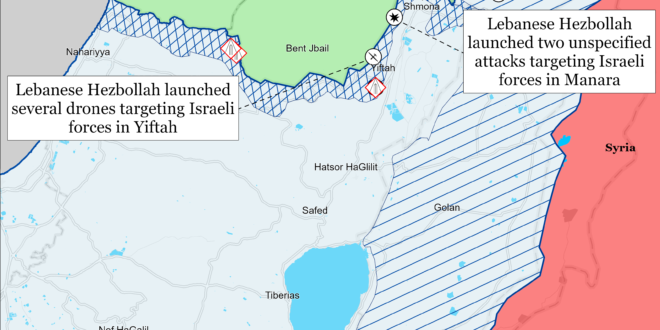Israeli forces launched a limited ground operation to control the Palestinian side of the Rafah crossing between Egypt and the Gaza Strip. Israeli forces advanced into eastern Rafah and took control of the Palestinian side of the Rafah crossing between Egypt and the Gaza Strip. The Israel Defense Forces (IDF) said that it began a “precise, intelligence-based counterterrorism operation” aimed at eliminating Hamas military infrastructure in eastern Rafah.[i] The IDF reported that Hamas fired mortars from the Rafah crossing into Israel on May 5, killing four Israeli soldiers and wounding others.[ii] Israeli forces advanced along the Egyptian border with the Gaza Strip to the Rafah border crossing and took “operational control” of the area.[iii] Israeli media reported that the IDF chose to capture the crossing given its role in smuggling advanced weapons between the Gaza Strip and Egypt in the past.[iv] CTP-ISW has not observed instances of weapons smuggling between the Gaza Strip and Egypt during the current war.
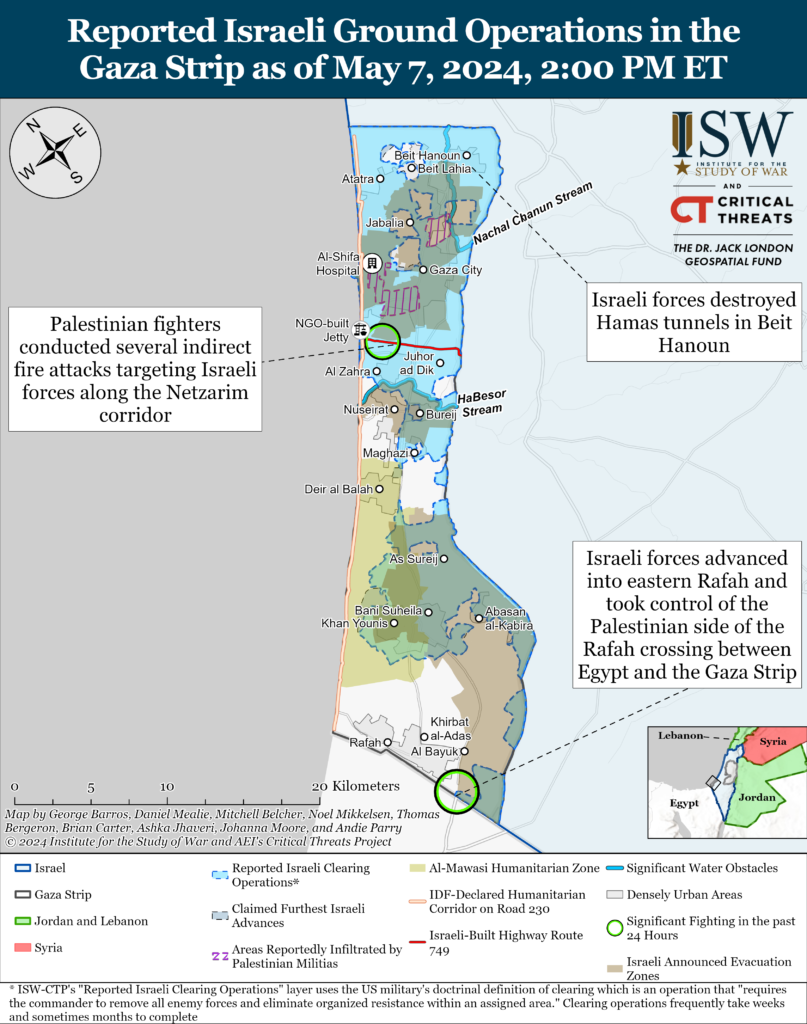
Hamas reported that its fighters fired a rocket-propelled grenade at an Israeli tank and proceeded to fire small arms at Israeli soldiers in al Shoka al Sufi neighborhood north of the Rafah crossing.[v] Several other Palestinian fighters fired rockets and mortars targeting Israeli forces advancing in eastern Rafah.[vi] The IDF reported that Palestinian fighters drove an explosive-laden car toward an IDF tank before Israeli forces struck it.[vii] Israeli forces killed approximately 20 Palestinian fighters overnight and located three tunnel shafts.[viii]
Israeli Prime Minister Benjamin Netanyahu said on May 7 that Israeli forces are operating in Rafah and will continue “until the absolute victory.”[ix] Israeli War Cabinet member Benny Gantz said the Israeli military operation in Rafah will ”continue and expand as necessary.”[x] The US State Department spokesperson said that the Israeli operation to the Rafah crossing appears to be limited at this time, but that it ”does look like prelude of a major military operation.”[xi] The operation followed Israeli evacuation orders for approximately 100,000 Gazans in eastern Rafah. These evacuation orders instructed the Gazans to temporarily evacuate to the humanitarian zone north of Rafah.[xii] Israeli tanks entered the Gaza Strip after Hamas altered and then approved the ceasefire agreement on May 6.[xiii]
Hamas acknowledged that the deal it “accepted” on May 6 satisfied its maximalist demands.[xiv] Indirect ceasefire negotiations continued between Israel and Hamas in Cairo on May 7. Israel did not receive the proposal on May 6 until an hour after Hamas “accepted” the deal.[xv] Hamas and Israel both sent delegations to the May 7 indirect talks.[xvi] The ongoing talks suggest that Hamas’ May 6 “accepted” proposal is better understood as a new counterproposal for a maximalist ceasefire. Hamas has not changed its maximalist demands in negotiations since December 2023. Hamas senior official Osama Hamdan acknowledged on May 7 that Hamas had not altered these maximalist demands in its latest proposal and that it had “set red lines that cannot be touched or given up.”[xvii] Israeli War Cabinet member Benny Gantz said that the Israeli delegation “doesn’t just have a mandate to listen—it has an obligation to turn over every stone and act to bring about an outline.”[xviii]
Hamas’ high-level delegation arrived in Cairo on May 7 after Israeli forces began a limited ground operation in Rafah.[xix] Hamas threatened on May 6 to halt negotiations if Israeli forces began a ground operation into Rafah.[xx]
Iranian officials appear increasingly confident in their view that the Axis of Resistance has the advantage against Israel and will ultimately destroy Israel. Islamic Revolutionary Guards Corps (IRGC) commander Maj. Gen. Hossein Salami said during a speech commemorating the April 1 death of senior IRGC commander Mohammad Reza Zahedi in an Israeli airstrike that Israel is “approaching the end of its political life” despite the West’s support for Israel.[xxi] Salami added that Hamas’ October 7 attack on Israel represented a complete intelligence failure by Israel that showed how “vulnerable some countries are to a limited invasion.” Salami added that the October 7 attack pushed Israel to the “brink of death.” Salami’s statement follows an interview from Maj. Gen. Gholam Ali Rashid, who is the commander of the Iranian Khatam ol Anbia Central Headquarters, in which Rashid described a multi-front ground attack into Israel that could destroy the Israeli state.[xxii] Salami, in an earlier interview in August 2022, described a very similar concept that included successive ground attacks into Israel on multiple fronts with increasing frequency.[xxiii]
Iranian and Axis of Resistance officials are also placing increasing emphasis on operations in the Mediterranean Sea. Salami stated that Iran and the Axis of Resistance are “closing the way for the enemy” in the eastern Mediterranean Sea.[xxiv] Other Iranian and Axis of Resistance officials have made similar claims recently. The Houthi movement announced on May 3 that it commenced the ”fourth phase” of escalation against Israel by targeting ships in the Mediterranean Sea.[xxv] A top Iranian military adviser to the supreme leader said in March that the Mediterranean Sea is part of Iran’s strategic depth and that Tehran must accordingly “increase [its] strategic depth [by] 5,000 kilometers.”[xxvi] Five thousand kilometers from Iran would extend to the Strait of Gibraltar. These statements suggest that Iran and its regional partners are putting an increased emphasis on the Mediterranean as an arena in which it could pressure Israel and others as needed.
Key Takeaways:
- Gaza Strip: Israeli forces launched a limited ground operation to control the Palestinian side of the Rafah crossing between Egypt and the Gaza Strip.
- Ceasefire Negotiations: Hamas acknowledged that the deal it “accepted” on May 6 satisfied its maximalist demands. Israel did not receive the proposal that Hamas accepted until one hour after Hamas accepted the deal on May 6.
- Iranian Views of the War: Iranian officials appear increasingly confident in their view that the Axis of Resistance has the advantage against Israel and will ultimately destroy Israel.
- Iraq: The Iraqi Kurdistan Region president is on a rare visit to Tehran and met with the IRGC commander.
- Lebanon: The IRGC Quds Force commander reportedly traveled to Lebanon in April, possibly to coordinate with Hezbollah Secretary General Hassan Nasrallah after the death of the primary Quds Force interlocutor with Hezbollah in an Israeli airstrike in April.
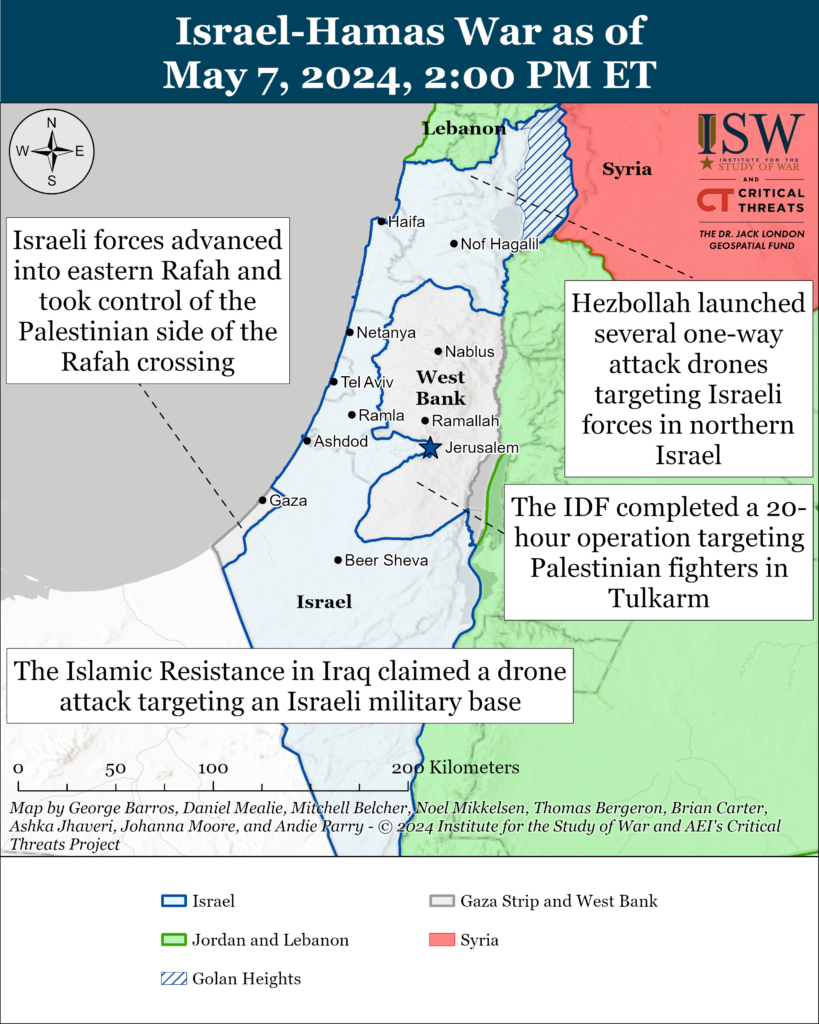
Gaza Strip
Axis of Resistance objectives:
Erode the will of the Israeli political establishment and public to sustain clearing operations in the Gaza Strip
Reestablish Hamas as the governing authority in the Gaza Strip
The IDF has been operating in Beit Hanoun in recent weeks to map and destroy two tunnels.[xxvii] At least one of the tunnels was an offensive tunnel used to infiltrate Israel in 2014. Israeli forces demolished the Hamas tunnels, which had been under continuous Israeli surveillance. Israeli forces directed airstrikes targeting a Palestinian fighter squad in the area during the operation.[xxviii] Palestinian militias including Hamas retain combat effective elements throughout the Gaza Strip that can disrupt Israeli raids. CTP-ISW has repeatedly reported on Hamas’ determination to reconstitute itself militarily and reassert itself in the northern Gaza Strip.
Palestinian fighters conducted several indirect fire attacks targeting Israeli forces along the Netzarim corridor on May 7.[xxix] Israeli forces continue to operate from forward operating bases along the Netzarim corridor to facilitate future raids into the northern Gaza Strip.[xxx]
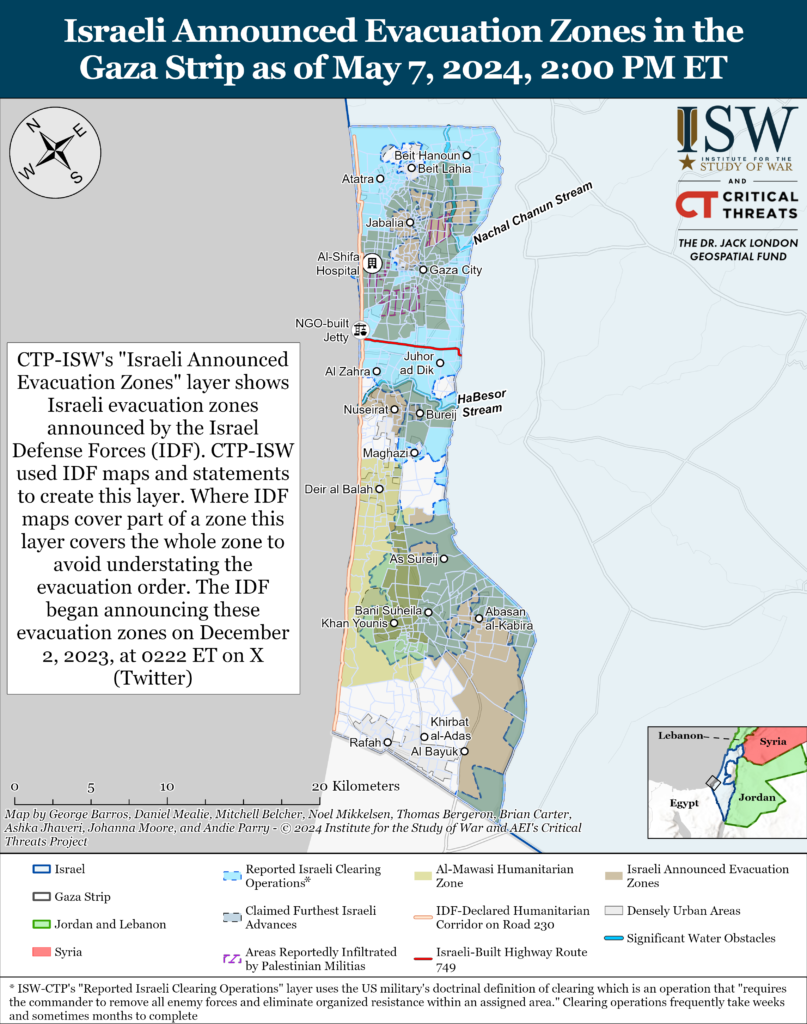
Hamas Political Bureau Chairman Ismail Haniyeh discussed ceasefire negotiations with Iranian Foreign Affairs Minister Hossein Amir Abdollahian in a phone call on May 7.[xxxi] Abdollahian expressed his support for Hamas’ ceasefire plan.
Palestinian militias conducted at least six indirect fire attacks from the Gaza Strip into southern Israel since CTP-ISW’s last data cutoff on May 6.[xxxii] Two Palestinian militias targeted an Israeli military site east of Rafah with rockets and mortars.[xxxiii] Israeli forces operating in eastern Rafah were based at the targeted site and significant amounts of Israeli armor remain there.[xxxiv] Palestinian fighters also fired rocket barrages at four Israeli sites near the Gaza Strip.[xxxv]
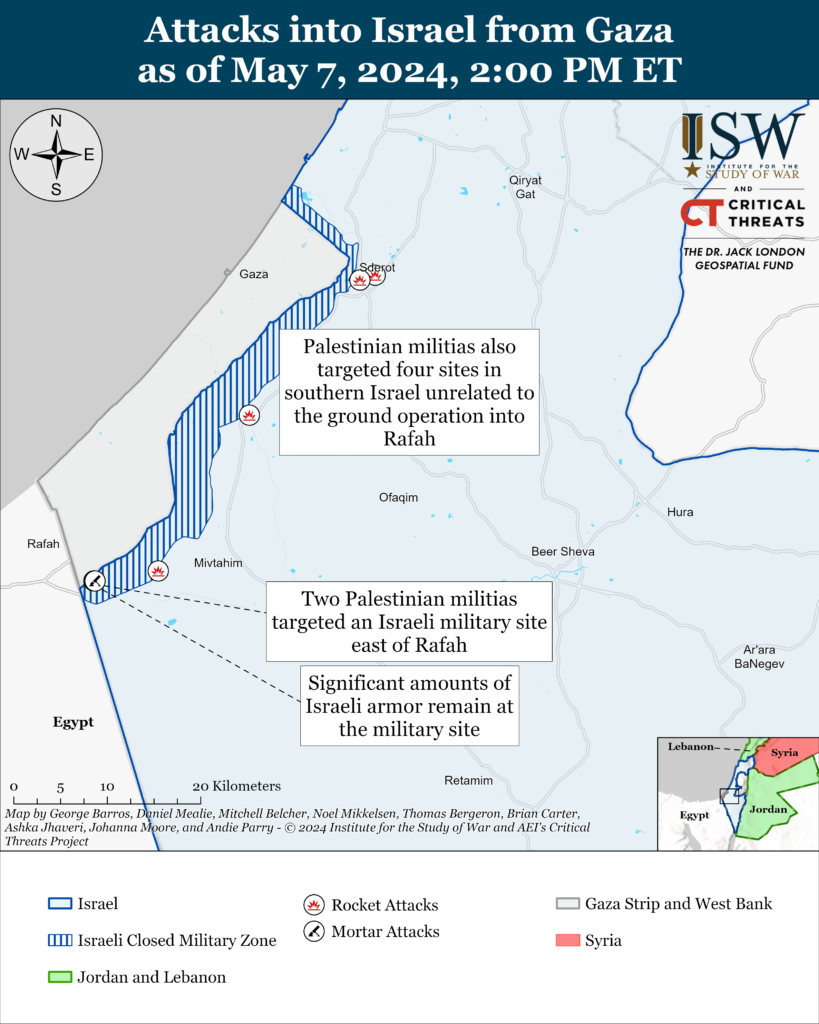
Recorded reports of attacks; CTP-ISW cannot independently verify impact.
West Bank
Axis of Resistance objectives:
Establish the West Bank as a viable front against Israel
Israeli forces have engaged Palestinian fighters in at least one location across the West Bank since CTP-ISW’s last information cutoff on May 6.[xxxvi] Unspecified fighters detonated an improvised explosive device (IED) in Jalboun near Jenin on May 6.[xxxvii]
The IDF announced on May 7 that it completed a 20-hour operation on May 6.[xxxviii] The IDF said that it destroyed three IED production sites, killed a Palestinian fighter, confiscated weapons, and raided over 60 buildings.[xxxix]
The IDF detained several wanted Palestinians and confiscated weapons and funds in operations across the West Bank on May 6.[xl] The IDF detained a wanted individual in Huwara with tens of thousands of Israeli shekels in “terrorist funds.”[xli]
Israeli civilians blocked roads and attacked Jordanian aid trucks at various points along the convoy’s journey to the Gaza Strip on May 7.[xlii] The Jordanian convoy of 35 trucks was delivering humanitarian aid to the Gaza Strip.[xliii] The Israelis blocked the convoy along Route 1 in Mevaseret Zion, at the Latrun Junction outside Jerusalem, and in some areas of the West Bank.[xliv] Israel Police and Israeli media reported that the civilians damaged several trucks and their contents in the attacks.[xlv] Israel Police arrested six Israelis overnight on May 6 and 7 in connection to the incident.[xlvi] Jordanian media confirmed on May 7 that the convoy reached the Gaza Strip .[xlvii] The Jordanian Foreign Affairs Ministry condemned the attack and blamed Israel for its failure to prevent attacks on aid convoys.[xlviii] US State Department spokesperson Matthew Miller called on Israel to arrest those responsible for the attack and to send a ”strong public message” to deter future attacks.[xlix] Israeli civilians previously blocked and delayed two Jordanian aid convoys as they crossed into the West Bank on May 1.[l]

This map is not an exhaustive depiction of clashes and demonstrations in the West Bank.
Southern Lebanon and Golan Heights
Axis of Resistance objectives:
Deter Israel from conducting a ground operation into Lebanon
Prepare for an expanded and protracted conflict with Israel in the near term
Expel the United States from Syria
Lebanese Hezbollah conducted at least ten attacks into northern Israel since CTP-ISW’s last data cutoff on May 6.[li] Hezbollah launched several one-way attack drones targeting Israeli forces in Yiftah and Ramot Naftali on May 7.[lii] The IDF intercepted one drone and said that two other drones landed in open areas.[liii] Some drones caused minor damage in several areas, including a fire in Yiftah.[liv]
The IDF said on May 7 that a Hezbollah drone attack killed two IDF reservists in Metula on May 6.[lv] The IDF added that another soldier was wounded in the attack.[lvi] Israeli media reported on May 6 that the drone wounded two Israelis but did not specify whether they were civilians or soldiers.[lvii]
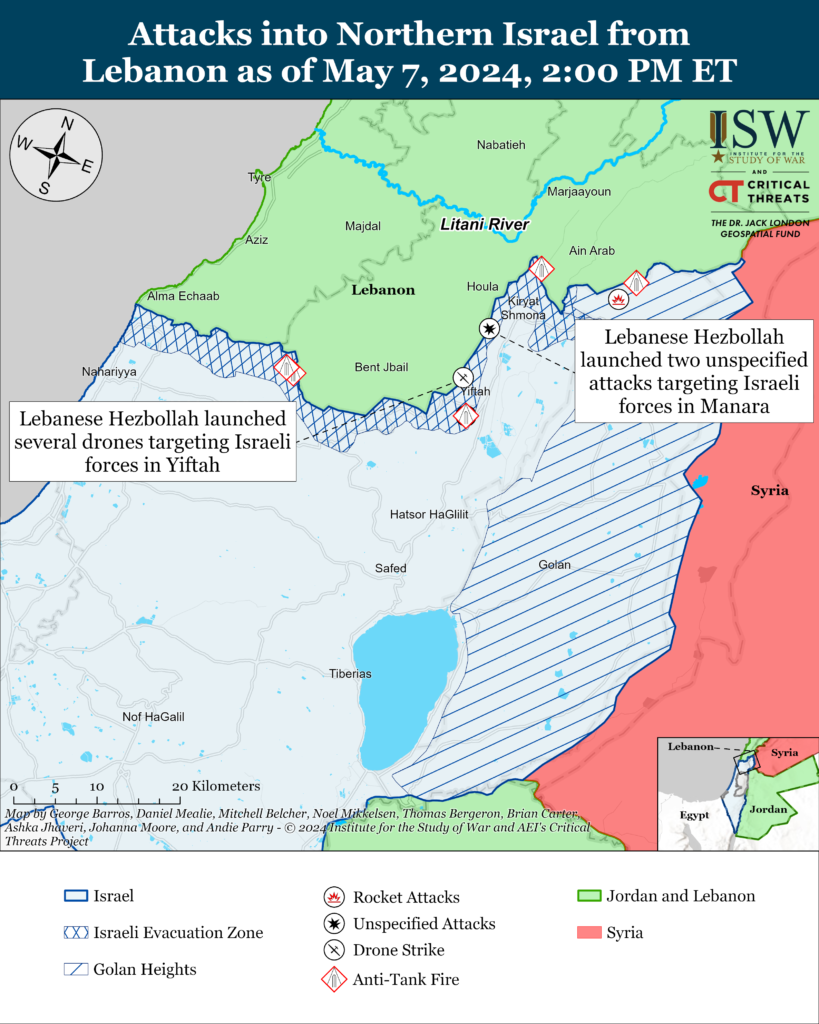
Recorded reports of attacks; CTP-ISW cannot independently verify impact.
Iran and Axis of Resistance
Saudi-owned al Arabiya reported on May 6 that IRGC Quds Force Commander Brig. Gen. Esmail Ghaani travelled to Beirut, Lebanon, “a few weeks ago” to discuss the Israel-Hamas War, citing unspecified sources.[lviii] Al Arabiya added that Ghaani met with Lebanese Hezbollah Secretary General Hassan Nasrallah to discuss “future measures that should be taken following the military events in Gaza and Lebanon.”[lix] Iran and the Axis of Resistance use periodic meetings between senior officials to coordinate responses to new developments in the region. Ghaani last visited Beirut in February 2024 to discuss the possibility of an Israeli offensive against Hezbollah with Nasrallah, for example.[lx]
It is possible that Ghaani met with Nasrallah following the death of IRGC Quds Force Brig. Gen. Mohammad Reza Zahedi to discuss the implications of Zahedi’s absence and an eventual Iranian retaliation for his killing. Israel killed Zahedi and several of his senior deputies in Damascus, Syria, on April 1.[lxi] Al Arabiya’s reporting does not clarify if Ghaani’s meeting with Nasrallah preceded or followed Iran’s April 13 retaliation to Israel’s killing of Zahedi. Zahedi’s prominent role as a liaison between the IRGC and Hezbollah—and the disruption that his death likely had on Iran-Hezbollah coordination—could have prompted a meeting between Nasrallah and Ghaani. Zahedi commanded the IRGC Quds Force unit responsible for overseeing operations in Lebanon, Jordan, Syria, and the Palestinian Territories and was the only non-Lebanese member of Hezbollah’s Shura Council. Nasrallah leads the Shura Council, which serves as the groups’ central decision-making authority.[lxii]
International Atomic Energy Agency (IAEA) Director General Rafael Grossi and Iranian officials continued discussions on how Iran will implement a nuclear inspections pledge made in 2023.[lxiii] Grossi last visited Iran in March 2023. Iran agreed to several initiatives during Grossi’s March 2023 visit, including allowing the IAEA to “implement further appropriate verification and monitoring activities” and “provid(ing) further information and access to address the outstanding safeguards issues.”[lxiv] The agreement followed undeclared Iranian operation changes in two advanced centrifuge cascades at the Iranian Fordow Fuel Enrichment Plant and the IAEA’s detection of near 84 percent highly enriched uranium particles at the cascade in 2023.[lxv]
Grossi and Atomic Energy Organization of Iran Director Mohammad Eslami acknowledged that Iran has failed to operationalize the pledges it made in 2023 in a joint press conference in Esfahan on May 7.[lxvi] Grossi stressed the need for Iran to adopt ”concrete, very practical, and tangible measures” to accelerate cooperation with the IAEA.[lxvii] Grossi stated that the pledge made in March 2023 had not yet been operationalized and required more ”substance.” Eslami said that Iran had continued to work with the IAEA on “unresolved issues,” including issues pertaining to two unspecified nuclear sites.[lxviii] Eslami separately announced that Iran is prepared for nuclear cooperation with regional actors like Saudi Arabia.[lxix] Eslami and Grossi denied reports that Grossi’s visit would result in a new agreement.[lxx] Grossi also met with Iranian Foreign Affairs Minister Hossein Amir Abdollahian and Deputy Foreign Affairs Minister for Policy Ali Bagheri to discuss improving IAEA-Iranian coordination on May 6.[lxxi]
Grossi announced in February 2024 that Iran was continuing to produce highly enriched uranium at an elevated rate.[lxxii] Grossi told Reuters on February 19 that Iran was producing 60 percent highly enriched uranium (HEU) at a rate of seven kilograms per month. This rate was higher than its three kilogram per month enrichment rate between June and November 2023. Iran has stockpiled at least five nuclear bombs worth of HEU, given its stockpile of 128.3 kilograms of 60 percent HEU as of October 28, 2023. The IAEA defines 25 kilograms of 20 percent or more enriched HEU as a “significant quantity” for “which the possibility of manufacturing a nuclear explosive cannot be excluded.” Iran has no plausible civilian use for 60 percent HEU but can use it in a compact nuclear explosive or further enrich it to 90 percent weapons-grade uranium.
Iraqi Kurdistan Regional Government President Nechirvan Barzani and IRGC Commander Maj. Gen. Hossein Salami discussed border security along the Iran-Iraqi Kurdistan Region border on May 7.[lxxiii] Barzani and Salami discussed strengthening security cooperation and coordination between Iran and the Kurdistan Regional Government to “combat security threats.” Iran has previously accused Kurdish Iranian separatist groups of using Iraqi Kurdistan to facilitate operations into Iran.[lxxiv] Iran and Iraq signed a border security agreement in March 2023 that requires Iraqi authorities to disarm and relocate members of Kurdish Iranian-separatist groups away from the Iran-Iraq border.[lxxv]
The Islamic Resistance in Iraq—a coalition of Iranian-backed Iraqi militias—claimed that it conducted a drone attack targeting the Israeli “Sapir” military site on May 6.[lxxvi] The IDF confirmed it intercepted a drone approaching Israeli territory “from the east” on May 6.[lxxvii] The IDF stated the drone did not cross into Israeli territory and caused no damage or casualties. Israeli media assessed that this marked the second night in a row that the IDF intercepted drones “apparently [launched] from Iraq.”[lxxviii] The Islamic Resistance in Iraq has claimed seven attacks on Israel since May 5.[lxxix]
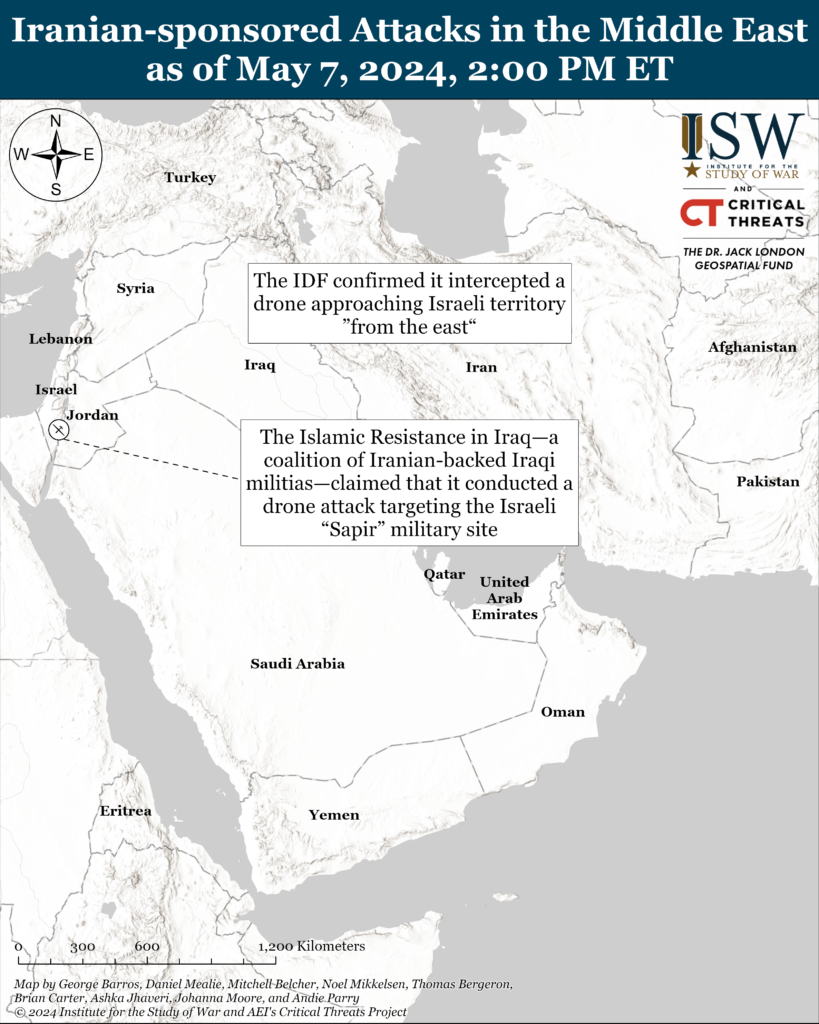
US CENTCOM intercepted a Houthi drone over the Red Sea on May 6.[lxxx] CENTCOM determined that these systems presented an imminent threat to US, coalition, and merchant vessels in the area.
The United Kingdom Maritime Trade Operations (UKMTO) reported on May 7 that the crew of a merchant vessel reported two explosions close to their vessel about 82 NM south of Aden, Yemen.[lxxxi]
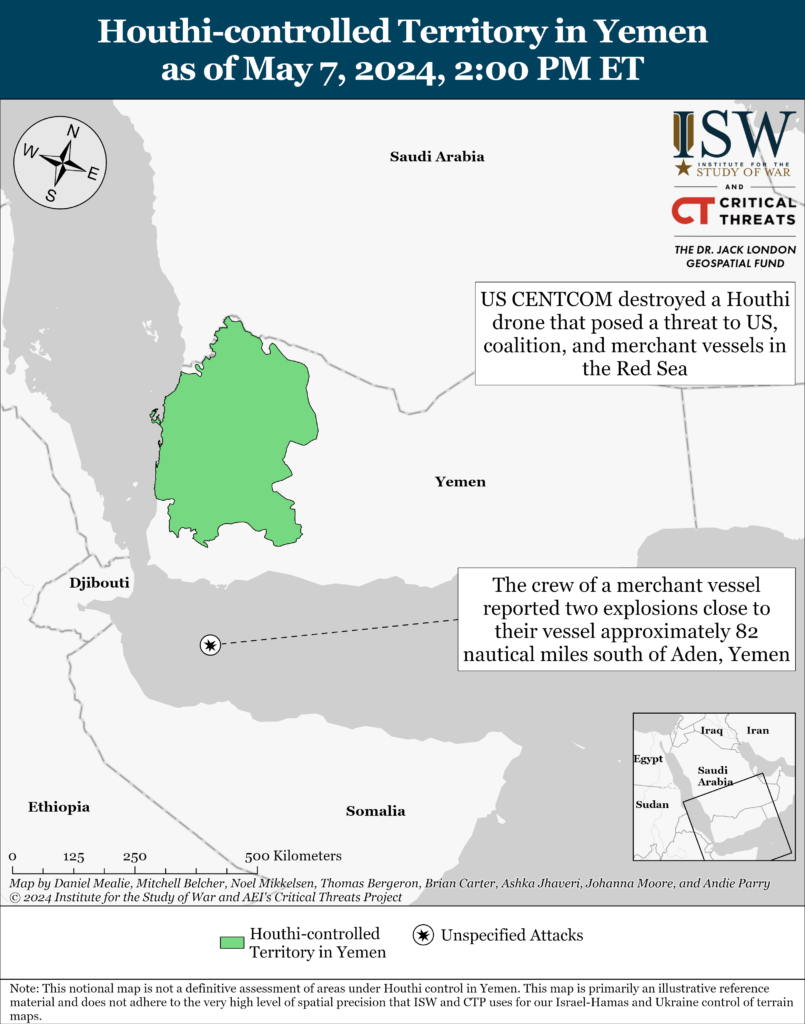
 Eurasia Press & News
Eurasia Press & News
